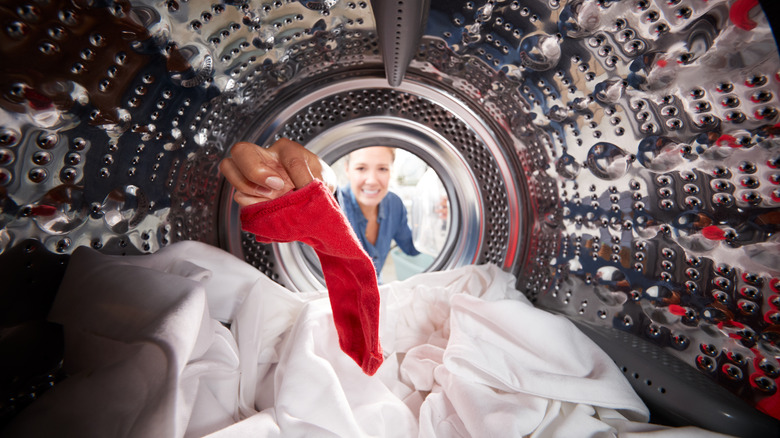What Washing Your Laundry In Hot Water Will Do To Your Clothes
The old saying goes, "Wash colors in cold water, wash whites in hot water." You may have been raised to follow this sentiment; decades ago, it rang pretty true. Cold or even lukewarm water did not remove stains as effectively as hot water in older top-loading washing machines. However, thanks to modern washing technology, consumers no longer have to rely on hot water to extract stains from clothes. According to Consumer Reports, modern washers require less energy and are powerful enough to wipe out stains using water in cooler temperatures. On another note, Consumer Reports also states that by using cooler temperatures to clean their clothes, homeowners save energy with each completed wash, lowering their electricity costs in the process.
With these implemented changes, should people still regularly use hot water to clean their laundry? The decision is certainly a personal preference, but doing so has consequences that must be considered before your clothing undergoes an unintended permanent change. Here are two examples of how using hot water for washing can affect your clothes.
Causes shrinkage
One of the most commonly cited outcomes of washing clothes in hot water is shrinkage due to select fabrics responding poorly to high temperatures. National appliance company Whirlpool says that even sturdier fabrics, like cotton and denim, can succumb to shrinkage when washed in hot water, recommending machine users opt for warm or cold washes instead. Hot water shouldn't be abandoned entirely for this reason, however. Canstar Blue states that hot washes are still beneficial for extracting set-in stains caused by substances that are particularly challenging to remove, like grease or oil. Though, warm water is still a safer bet, says Canstar Blue, unless the dirty laundry is heavily soiled.
Hot water is also the most efficient in killing germs. So, using a hot cycle may be best when washing towels or bed linens, especially after recovering from an illness. But doing so also speeds up the deterioration of your towels, so selecting cooler washes from time to time will likely increase the lifespan of your towels, per Canstar Blue.
Causes fading
It's common knowledge to separate laundry loads by color to avoid color transfer from darker items to white pieces. Well, why does color from darker clothes bleed and transfer to other articles of clothing so easily? The answer has much to do with hot water and its effect on pigmented fabrics.
Aside from shrinking, hot washes can also cause colored laundry to fade, explaining why consumers use hot water to keep white laundry from becoming discolored. Colored laundry, especially pieces of darker hues, like black and dark red, attribute their pigmentation to dye that saturates the fabric before being turned into clothing or linens. When met with hot water in a wash cycle, this dye can run or bleed out, according to The Maids, leading to laundry appearing faded once the wash is complete. Some fabrics are more susceptible to fading than others, so read the care tags attached to your laundry items carefully to ensure you're using the appropriate settings on your washing machine.


